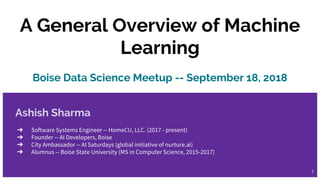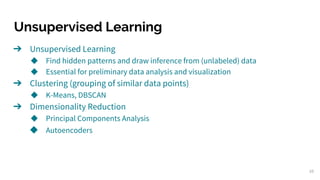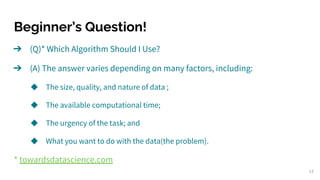A General Overview of Machine Learning
- 1. A General Overview of Machine Learning Boise Data Science Meetup -- September 18, 2018 Ashish Sharma ? Software Systems Engineer -- HomeCU, LLC. (2017 - present) ? Founder -- AI Developers, Boise ? City Ambassador -- AI Saturdays (global initiative of nurture.ai) ? Alumnus -- Boise State University (MS in Computer Science, 2015-2017) 1
- 2. Overview Ī± AI and Applications Ī± Intro to Machine Learning Ī± Types of Machine Learning Ī± Which algorithm should I use? Ī± Effective Machine Learning Image Source: Cousins of Artificial Intelligence -- Towards Datascience 2
- 3. AI Resurgence ? Computational Power (GPUs, cloud computing, distributed systems) ? Availability of large amount of Data (eg. Imagenet) ? Better theoretical understanding of the underlying techniques/algorithms ? Open and easily accessible research culture in academia and industry (NIPS, ICML, archiv.org) 3
- 4. AI Resurgence (contd..) ? Netflix Challenge (2009) $1 Million Prize (User ratings for films) ? Kaggle (2010) (over more than a million users today) ? Fei-Fei Li and team at Stanford open sourced ImageNet (2008-2010) Ī¶ Imagenet Large Scale Visual Recognition Challenge (ILSVRC) ? Geoffrey HintonĪ»s Deep Learning Team wins ImageNet 2012 (Alexnet) 4
- 5. Common Applications ? Speech recognition (virtual assistants) ? Advanced machine translation and natural language intelligence ? Strategic gaming algorithms (AlphaGo, chess) ? Computer Vision (image classification and object detection) ? Autonomous Vehicles ? Manufacturing Companies (landing.ai) ? Healthcare (GoogleĪ»s research on diabetic retinopathy -- with F-score of 0.95, surpassing the accuracy of 8 expert ophthalmologists) 5
- 6. Machine Learning ? Form of applied statistics with emphasis on the use of computers to learn complex mathematical functions. ? More formally, Ī░A computer program is said to learn from experience E with respect to some class of tasks T and performance measure P, if its performance at tasks in T, as measured by P, improves with experience E.Ī▒ Image Source: xkcd 6
- 7. Types of Machine Learning ? Supervised Learning ? Unsupervised Learning ? Reinforcement Learning 7
- 8. Supervised Learning Terminologies: ? Input variable(s) Ī¶ independent variable(s) Ī¶ feature(s)/characteristic(s) of a single input object Ī¶ Numerical -- continuous ( height, area of house) , discrete (grades, age) Ī¶ Categorical (race, sex) -- nominal, ordinal ? Target variable(s) Ī¶ Dependent variable(s), number/vector (eg. price of house, patient is diabetic, etc.) 8
- 9. Supervised Learning ? Function approximation Ī¶ Mathematically: solve for coefficient(s) of a function Ī¶ Search for a best performing model from a hypothesis space. Ī¶ Make predictions based on historical (labeled) data ? Regression (predict continuous target variable) Ī¶ Univariate Regression (1 input variable, 1 output variable) Ī¶ Multiple Regression (>=2 input variables, 1 output variable) Ī¶ Multivariate Regression (>=2 output variable) ? Classification (predict discrete/categorical target variable) Ī¶ Email: Spam or not? Ī¶ Is this image a dog or cat? 9
- 10. Unsupervised Learning ? Unsupervised Learning Ī¶ Find hidden patterns and draw inference from (unlabeled) data Ī¶ Essential for preliminary data analysis and visualization ? Clustering (grouping of similar data points) Ī¶ K-Means, DBSCAN ? Dimensionality Reduction Ī¶ Principal Components Analysis Ī¶ Autoencoders 10
- 11. Reinforcement Learning ? AI, Animal Psychology, Control Theory ? Agents, Actions, Environment, Change in State, Reward/Punishment ? Eg. Deep Attari: Ī¶ Input: Snapshots of Attari board images (State and Actions) Ī¶ Algorithm: Convolutional NNs with no pooling Ī¶ Output layer: tailored for regression score (Maximize Reward) 11
- 12. BeginnerĪ»s Question! ? (Q)* Which Algorithm Should I Use? ? (A) The answer varies depending on many factors, including: Ī¶ The size, quality, and nature of data ; Ī¶ The available computational time; Ī¶ The urgency of the task; and Ī¶ What you want to do with the data(the problem). * towardsdatascience.com 12
- 13. Which algorithm should I use? Ī¶ No one algorithm works best for every problem (Yes, not even neural networks!) 13
- 14. Important Concepts ? Model Selection: Ī¶ K-crossfold validation Ī¶ Train/Test/Evaluation Dataset ? Loss functions ? Convex Optimization ? Gradient Descent ? Model Complexity, Overfitting and Underfitting ? Regularization ? Training and Generalization Errors 14
- 15. Questions to ask when working on ML project! ? How much data do I have? What type/nature of data? ? How skilled and knowledgeable am I in this domain? Ī¶ Will I be able to create more useful features from what I already have? ? How good am I in error analysis? 15
- 16. Questions to ask when working on ML project! ? Assumptions, Limitations and Adoption (ALA rule) of the algorithm. Ī¶ Linear Regression (linear relationship, no or little multicollinearity, etc.) Ī¶ Why does this particular loss function make sense? ? How good am I in debugging the chosen learning algorithm? 16
- 17. Effective Machine Learning ? Reduce time spent in programming (more experiments in short time) Ī¶ Use off the shelf tools ? Customize and Scale Products Ī¶ Start simple, scale as needed (again, choice of relevant toolsets) ? Think like a Scientist Ī¶ Use statistics, not logic, to make decisions from the real world observations * ║▌║▌▀Ż content referred from GoogleĪ»s Machine Learning Crash Course 17
- 18. Thank You Ashish Sharma Email: accssharma@gmail.com /in/accssharma @accssharma AI Developers, Boise: https://github.com/aidevelopersboise/ai6-boise-materials HomeCU is hiring Software Engineers and Mobile Developers. https://www.homecu.net/company-jobs.html 18
- 19. Visual Demonstrations ? K nearest neighbor: http://vision.stanford.edu/teaching/cs231n-demos/knn/ ? CIFAR 10 Image Classification: https://cs.stanford.edu/people/karpathy/convnetjs/demo/cifar10.html 19



















